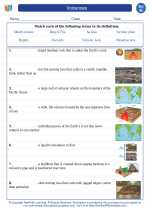Volcanism
Volcanism refers to the process of magma and volcanic gases rising from the Earth's interior to the surface, resulting in volcanic eruptions, the extrusion of lava, and the formation of volcanic landforms. It is a key geological process that shapes the Earth's surface and plays a significant role in the Earth's geothermal and tectonic systems.
Types of Volcanoes
- Shield Volcanoes: Broad, gently sloping volcanoes characterized by low viscosity lava flows.
- Stratovolcanoes: Tall, steep-sided volcanoes composed of alternating layers of lava flows, volcanic ash, and other volcanic debris.
- Cinder Cone Volcanoes: Small, steep-sided volcanoes built from ejected lava fragments.
- Calderas: Large, basin-shaped volcanic depressions typically formed by the collapse of a magma chamber after a massive eruption.
Volcanic Eruptions
Volcanic eruptions can be explosive or effusive, depending on the viscosity and gas content of the magma. Explosive eruptions are typically associated with high-viscosity magma and result in the ejection of volcanic ash, gases, and pyroclastic materials. Effusive eruptions, on the other hand, involve the relatively gentle outpouring of low-viscosity lava flows.
Geological Hazards
Volcanic eruptions can pose significant hazards to human populations and the environment, including the release of toxic gases, pyroclastic flows, lahars (mudflows), and ashfall. Understanding these hazards is crucial for effective hazard mitigation and disaster preparedness.
Study Guide
Key concepts to understand when studying volcanism include the types of volcanoes, volcanic eruptions, geological hazards associated with volcanism, and the role of volcanism in shaping the Earth's surface and influencing the environment. Be sure to review the characteristics of different types of volcanoes and the factors that influence the explosivity of volcanic eruptions.
Additionally, familiarize yourself with the processes that lead to the formation of volcanic landforms and the monitoring and mitigation strategies used to assess and reduce volcanic hazards. It's important to grasp the significance of volcanism in the context of plate tectonics and the geothermal energy resources associated with volcanic activity.
Finally, practice applying your knowledge of volcanism to real-world examples of volcanic eruptions and their impacts on human societies and the natural environment.
Remember to regularly review key terms and concepts related to volcanism and seek out additional resources, such as scientific articles, videos, and interactive simulations, to deepen your understanding of this dynamic geological process.
.◂Science Worksheets and Study Guides Eighth Grade. Volcanoes
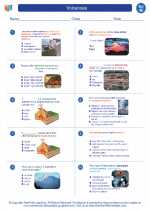
 Worksheet/Answer key
Worksheet/Answer key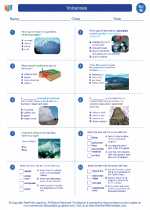
 Worksheet/Answer key
Worksheet/Answer key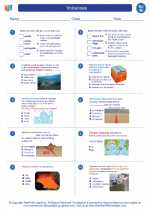
 Vocabulary/Answer key
Vocabulary/Answer key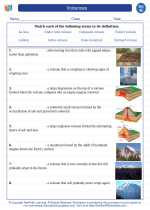
 Vocabulary/Answer key
Vocabulary/Answer key
 Vocabulary/Answer key
Vocabulary/Answer key